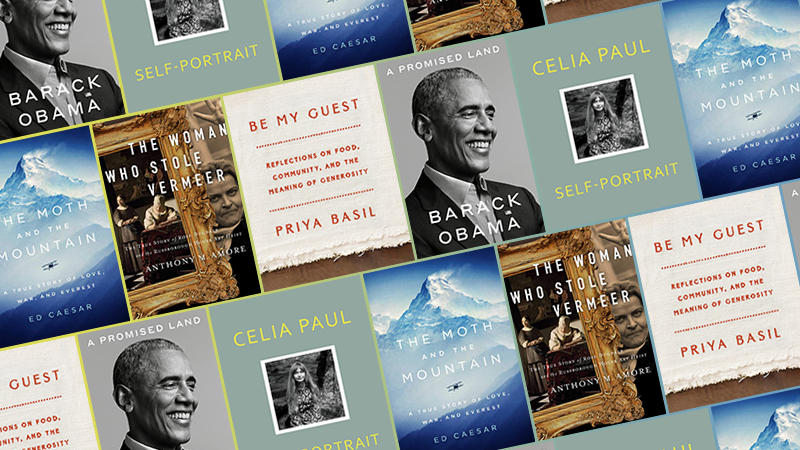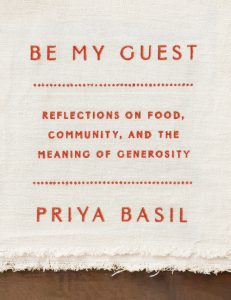
Barack Obama’s A Promised Land, Celia Paul’s Self-Portrait, Ed Caesar’s The Moth and the Mountain, Anthony M. Amore’s The Woman Who Stole Vermeer, and Pryia Basil’s Be My Guest all feature among November’s best reviewed memoirs and biographies.
1. A Promised Land by Barack Obama
(Crown)
8 Rave • 9 Positive • 3 Mixed
“Reading Barack Obama’s deeply introspective and at times elegiac new presidential memoir, I thought often about something the writer James Baldwin said in 1970, two years removed from the assassination of Martin Luther King Jr. and despairing about America from abroad. ‘Hope,’ an exhausted Baldwin told a reporter from Ebony magazine, ‘is invented every day.’ … A Promised Land often reads like a conversation Obama is having with himself—questioning his ambition, wrestling with whether the sacrifices were worth it, toggling between pride in his administration’s accomplishments and self-doubt over whether he did enough. Written in the Trump era, under an administration bent on repudiating everything he stood for, his elegant prose is freighted with uncertainty about the state of our politics, about whether we can ever reach the titular promised land … this 701-page tome—part one of two—isn’t the usual post-presidential legacy-burnishing project. There is a literary grandness, to be sure—references to Hemingway and Yeats and dramatic renderings of moments high and low captured in sometimes Sorkin-esque dialogue. But the triumphs are tempered with brooding reflections about the inevitable limitations of the presidency. In this surprisingly fast-moving volume, the audacity isn’t in the hopefulness but the acknowledgment of its low ebb.”
–Eli Stokols (The Los Angeles Times)
2. Self-Portrait by Celia Paul
(New York Review of Books)
8 Rave • 3 Positive
“It’s an account of a life so rigorously dedicated to art and family that fame seems beside the point … As a writer, she’s possessed of a heightened sensibility, a particular vantage on to the world … Self-Portrait illuminates what Freud’s long shadow obscured: Celia Paul herself, and an altogether different way of being an artist … Paul speaks of Freud not as a teacher, but a lover, a man who both delighted and frustrated her. She does not engage in the question of what effect his style might have had on her artistic development, nor does she answer whether her youthful experience modeling for Freud informed her own practice of painting … Celia Paul is a more gifted writer than she has any business being; it’s almost unfair … Self-Portrait reads like a novel. Paul alights on a topic, offers asides and digressions, circles back to her main point. The work is written with intention but wears it lightly … Her painting is not an act of close observation—she’s seen these people before—but some deeper communion with the person she’s aiming to fix on canvas. It’s impressive that she’s able to render them in words, too, on the page: Freud, her parents, and, of course, herself. ”
–Rumaan Alam (The New Republic)
3. The Moth and the Mountain: A True Story of Love, War, and Everest by Ed Caesar
(Avid Read Press)
6 Rave • 5 Positive • 1 Mixed
Read Ed Caesar on five epic works of mountain literature here
“This tale of a ‘driven and defiant’ amateur and his dream is true and presented with brio by Ed Caesar … The author is a talented storyteller with a flair for detail. His subject’s absurdity is not lost on him. Yet Mr. Caesar also displays a handsome refusal to laugh at anyone’s dreams … Wilson’s story is an entry less in the annals of mountaineering than in the Book of Life. That such an extraordinary person even existed is cause for celebration … To give every detail of Wilson’s tenacious struggle upon Everest would be to spoil an outstanding book … returns readers to a romantic era when Everest was terra nova rather than an experience to be bought. It remained unvanquished. From the first page we know Wilson never stood a chance. But no one ever made a more dashing attempt.”
–Michael O’Donnell (The Wall Street Journal)
4. The Woman Who Stole Vermeer: The True Story of Rose Dugdale and the Russborough House Art Heist by Anthony M. Amore
(Pegasus Crime)
6 Rave • 1 Positive
Read an excerpt from The Woman Who Stole Vermeer here
“As Amore illustrates with an irresistible blend of wryness and affection, [Rose’s] adopted proletarian role was not always convincing or particularly noble … Amore’s winning detachment is unchanged as Rose evolves from debutante to desperado … Amore’s publisher has falsely advertised his droll, engaging book as an ‘unbelievable’ heist story. Ocean’s 8 (or 11, 12, 13) it’s not, Dugdale is more Fawlty than Ocean. Yet this in no way diminishes the pleasures of The Woman Who Stole Vermeer. Rose is terrific company: clever, forthright and flamboyant.”
–Max Carter (The New York Times Book Review)

5. Be My Guest: Reflections on Food, Community, and the Meaning of Generosity by Priya Basil
(Knopf)
4 Rave • 3 Positive
Read an excerpt from Be My Guest here
“Reading this slender, rich exploration of what it means to cook for others is like pulling up a chair at the ideal dinner party. The food is mouth-watering—creamy curries, candied baobab seeds, fat slices of homemade pizza—but just as nourishing is the conversation, which embraces hospitality in its many guises, from the strained welcome received by Syrian refugees in the author’s adoptive Germany to the langar, a free meal served in Sikh temples … Add a pinch of Derrida and a slug of retro pop culture, and you’ve got an irresistible amuse-bouche.”
–Hephzibah Anderson (The Guardian)

